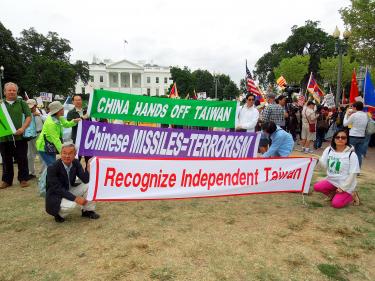US President Barack Obama reportedly declared his “strong commitment” to the Three Joint Communiques and the Taiwan Relations Act during his White House summit with Chinese President Xi Jinping (習近平).
While details of discussions concerning Taiwan remain secret, Obama is understood to have firmly supported Taiwan.
A congressional source told the Taipei Times that Xi raised the subject and Obama responded.
The source did not know if Taiwan’s upcoming presidential elections were mentioned.
About 600 anti-China protesters — 60 of them Taiwanese waving placards and banners — could be heard clearly as they chanted slogans from a nearby park.
“I reiterated my strong commitment as well to our ‘one China’ policy based on the Three Joint Communiques and the Taiwan Relations Act,” Obama said on Friday at a joint press conference in the White House garden.
Xi did not mention Taiwan at the news conference.
The two leaders took few questions and none of them concerned Taiwan.
The major announcement to emerge from the news conference was that the US and China vowed to fight global warming and halt commercial cybertheft.
At the joint news conference, Obama chided China on its treatment of dissidents and insisted hacking attacks on US firms must stop, even as he thanked Xi for his commitment on climate change.
The world’s top two economic powers are also its biggest polluters, and campaigners hailed their commitment to reduce emissions as a key step toward a global climate pact before the end of the year.
Provocatively, Obama directly cited the name of Beijing’s number one bugbear — the Dalai Lama, the exiled Tibetan Buddhist leader seen by China as a criminal separatist — at the leaders’ joint news conference.
“Even as we recognize Tibet as part of the People’s Republic of China, we continue to encourage Chinese authorities to preserve the religious and cultural identity of the Tibetan people and to engage the Dalai Lama or his representatives,” Obama said.
The two delegations promised not to spy on each other’s private enterprises for commercial gain, but here again, Obama used tough language, declaring: “I indicated it has to stop.”
Xi said that “China strongly opposes and combats the theft of commercial secrets and other kinds of hacking attacks.”
The Chinese leader also firmly pushed back on human rights criticism, warning that reform would come on China’s own timetable and without undermining its stability.
“We must recognize that countries have different historical processes and realities, that we need to respect people of all countries in the rights to choose their own development path independently,” he said.
Against this background, the agreement on climate change — both countries signed a “joint vision” ahead of December’s UN climate summit in Paris, and China committed to a domestic “cap and trade” carbon exchange — was all the more notable.
China is also to set aside US$3.1 billion for a fund to help developing countries fight climate change.
“If the world’s two largest economies, energy consumers and carbon emitters come together like this, then there is no reason for other countries, whether developed or developing, to not do so as well,” Obama said.
UN Secretary-General Ban Ki-moon commended both countries for the “significant steps” they pledged to take on the climate.
“This announcement bolsters prospects for a universal, meaningful agreement in Paris this year,” the secretary-general’s spokesman said.
Shortly after the summit meetings closed, the US-Taiwan Business Council issued a statement signed by its president, Rupert Hammond-Chambers, that said “for the first time in a number of years,” Xi was worried about Taiwan.
It said the Democratic Progressive Party was likely to win the January presidential election and “this realization is causing growing panic among those vested in China’s vision of unification with Taiwan.”
The statement said that the US had slowed its engagement with Taiwan to a crawl and demonstrated a lack of will and intent to maintain peace and security in the Taiwan Strait.
Taipei’s underinvestment in Taiwan’s national defense has to end, Hammond-Chambers said.
“No US government can reasonably undertake support for new defensive capabilities if Taiwan takes its national defense less seriously than the US does,” the statement said.
Source: Taipei Times - 2015/09/27





















